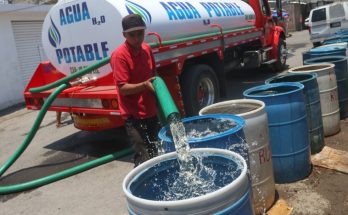By Alejandro Angulo
The discussion on the Water Law initiative in the State has permeated and is not over yet, it is only the beginning of many arguments for and against, which outlines the path of open and closed communication, but which can be heard in the streets, cafes, workplaces and in the corridors of the legislature.
It was not for less, because in the end it is about discussing the Human Right to Water and Sanitation, which undoubtedly involves all the citizens of the state who need water to survive.
The points on which the focus has been placed are not many, but they rest on key aspects such as the environmental side of water, its uses and administration, while the second is more about the operation, administration and its derivatives such as the concession, which for some means or represents the deity of privatization.
However, both sides of the discussion cannot ignore the human right to water, since the inhabitants of a town transcend when they are grouped in societies composed of citizens who are granted fundamental rights, and in this sense they must express their opinion, their proposals and disagreements, since a right not only entails rights, but also obligations with respect to its exercise and its object itself.
This condition of citizens makes them shareholders in the system as an interested and active party, in addition to being beneficiaries they are direct actors with a deep interest in the common good, comprising a network of institutions that can be trusted and can be expected to ensure the soundness and reliability of that human right to water, translated into a collective insurance policy issued by the State.
Therefore, any type of administration and operation of drinking water and sanitation services is subject to the human right to water, even though the government in its different modalities (federal, state or municipal) is the holder, responsible and obliged to protect this right, but not a company, whose limits and purposes do not cross the obligation to comply with the collective water insurance policy of guaranteeing water beyond a contract that expresses a mercantile relationship, but not of compliance with obligations that are at the top of human rights and especially of a vital resource for life such as water.
And on the other hand, this right to water also crosses the environmental issue, since the environmental conservation of water sources and its reuse, once the wastewater is treated, allows to be the guarantor of the collective water policy of the right to water. And it is not possible to disappear it, since it is an inherent part of the water-rights equation, otherwise we would fall into the paradox of indemnity (how to guarantee what cannot be guaranteed), which in other words means that how can the human right to water be guaranteed if the water does not exist, that is, if it has been exhausted. Therefore, the first step is to guarantee water conservation, and then to guarantee access to water.
The discussion is not about the number of ways in which we can obtain water, whether surface or subway, from public or private systems, on tap or by tandeo, nothing like that, the essential thing is about natural elements such as water, is there or not the volume of water available to guarantee the human right and secondly, if there is, who has the obligation to provide us with water?
Thus, the public discussion is not about an operating manual, it is much more than that, it is about our human rights to water and sanitation. In other words, it is the collective discussion to strengthen solidarity, the vision of the common good and to remove the fear of being excluded, both from the discussion and from the water resource.
The state’s Political Constitution establishes the obligation of:
ARTICLE 2. In the State of Queretaro, every person shall enjoy the Human Rights recognized by the Political Constitution of the United Mexican States and the international treaties to which the Mexican State is a party, the federal laws, this Constitution and the laws that emanate from it, as well as the guarantees for their protection. The norms related to Human Rights shall be interpreted in accordance with the aforementioned ordinances, favoring at all times the broadest protection to the people.
And what is described in its article 5° leaves no doubt when it says:
Every person has the right to an environment adequate for his development and integral wellbeing; it is the obligation of the authorities and the inhabitants to protect it.
The protection, conservation, restoration and sustainability of natural resources shall be priority tasks of the State.
The State of Queretaro has the main duty to develop the structure and implement policies and strategies tending to strengthen and guarantee the protection and assistance of the populations, as well as to safeguard the property and the environment against natural or anthropogenic disasters and in conditions of vulnerability. Therefore, it is a Human Right of all people to have access to the civil protection of the State and the Municipalities when a catastrophe occurs, having the inhabitants, in turn, the duty to actively participate, complying with the necessary measures and collaborating with the authorities in the prevention of disasters.
This is what the collective water policy issued by the State is all about.




